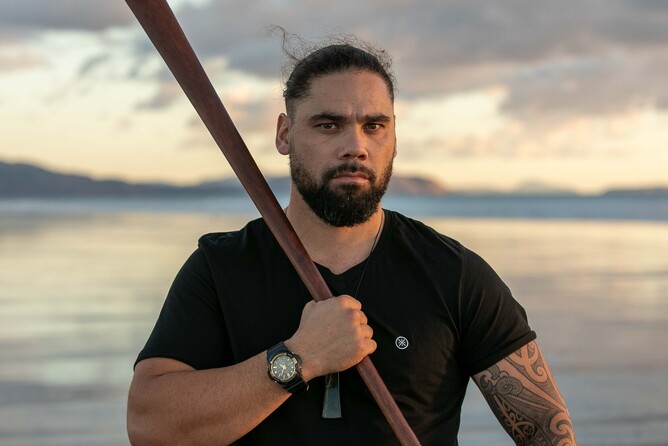When I was young it was just pretty rough. There was a lot of drinking, lots of gang stuff, and lots of violence. I thought that’s what being an adult was. It was terrifying. There were people getting shot, stabbed, run over, beaten to pieces… I watched someone get murdered at age 13. A year later I saw another.
I left school early and joined the gang. I thought I had to, because I was scared, and no one messed with them. I thought that was all there was. I didn't know there could be choices, that we could do whatever we wanted with our lives. I thought you just grew up and just responded, or reacted, and that’s it. I was traumatised, everyone was traumatised - and no one knows they’re traumatised. My whole identity was reacting and trying to survive.
When I was 19, I got sentenced to life. For murder.
Mentors would have been good. I didn’t know how the world worked, no one around me knew how it worked. I had low self-esteem, no confidence. A role model could say “stop doing all of that shit, you don’t have to” - and show you how to get to where you want, and show that it is possible. There were no role models. I could see pākehā that were successful and happy, but I didn’t know Māori could be that way too, I had no idea. To see that would have been powerful.
I didn’t have to go down the paths I did. Getting to where I am now was a long road and it did not have to be that long. There was a lot of energy that went into that. A lot of heartbreak. A lot of breaking people’s hearts. A lot of shame. Kids don’t need to go down that road.
Kids need to know they’re all good. Like “It’s going to be all good. You matter.” These kids don’t know that they actually matter, that someone cares. They don’t even know that someone should care. They’re dealing with all sorts of shit and they’re doing it as rangatahi! It messes with identity and that’s a big thing. When you identify with your trauma, you think that's who you are, and all that you’re worthy of - and you’re always going to go off track.
So they need to see who they actually are, like being given access to te ao Māori, te reo, mana tikanga, shown they’re part of the whenua, part of a group, part of something. That’s an attraction of the gangs. Everyone wants to identify with something that makes you part of the collective. Most of these rangatahi they get kicked outta class, kicked outta school, and thrown in jail – their history is rejection. So if they can be part of something that they're proud of, they can say “I’m part of this. This is us.” There’s strength in that, that’s power.
But we need to listen to their voice first, understand their situation, acknowledge their mana, and then use what we know, to try and help them get to where they want to go. We can’t just do the old “just get a job” thing because their world is completely different to what our world was. But we can start to give them confidence and security by helping them make connections to teach them they can take care of themselves. Everyone needs that.
Skill development is really important, it’s like breathing. They need to learn how to win in the real world, to thrive in normal society, and then the value will come. That’ll give them autonomy and freedom. You can send these kids out into the bush and train them hard all day long, and they’ll love that they can see what can be achieved in a week, but when they get back to the normal world, how does that all fit? It doesn’t.
Everything today for rangatahi is fast paced and “all about me”. The age we’re in, they have all the information, but they don’t know how to use it. They know what’s happening with the environment, but they don’t understand the power of working collaboratively, they’ve never had an opportunity to develop delayed gratification.
There’s a lot of practical things that can come from learning to grow your own food... from preparing the land, cultivating, germinating, and nurturing ‘til you see the fruits of your labour right in front of you. That’s what excites me about this kaupapa - the kids can see what they can do together, the power of working collaboratively. And working with the soil… The ancestors make up what the soil is, the earth is us, and it’s important to know that stuff. They need to know their whakapapa, understand their tūrangawaewae, that they matter – it’s all connected.
I've seen kaupapa like this totally change people's lives, including my own. I'm only here now because a kaumātua came into my life, nurtured me, and showed me love. He didn’t judge me on what I’d done, he gave me connections to my whakapapa.
This is a people-based kaupapa and if you focus on people, then you don’t have to worry about profits, because the people will generate profits if they’re happy and thriving. If you focus on profits, people get left behind and then you have to start responding with police and prisons.
Prioritise people and cultivate their natural passions, and we’ll reach levels we’ve never reached before.
